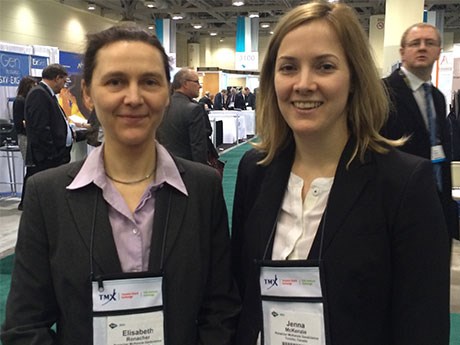Ronacher McKenzie helps exploration companies make the most of limited budgets
The depressed state of the mineral exploration industry has most geoscientists hanging onto their jobs or desperately seeking work, but two young women with years of experience working for an established geoscience consulting company decided it was the perfect time to cut the cord and start their own business.
Elisabeth Ronacher and Jenna McKenzie weren’t put off by the slim pickings in an industry that has seen exploration and deposit appraisal expenditures halved since 2011.
“It was time to move on,” said Ronacher, a Sudbury-based geologist with a PhD from the University of Alberta. “We were ready for a new challenge and we thought we could fill a niche in the industry.”
McKenzie, the other half of Ronacher McKenzie Geoscience, is a geophysicist based in Toronto. Both spent years working for Caracle Creek Consulting and saw a need for a smarter, data driven approach to finding the proverbial needle in a haystack.
What sets them apart is a much closer collaboration between the twin disciplines of geology and geophysics.
“Most companies don’t do geological and geophysical consulting,” said Ronacher. “Some companies have a geophysics group, but the co-operation between the geologists and the geophysicists isn’t as strong as it is with us. For example, when Jenna finds geophysical features in a survey, we try to interpret those features from a geological point of view. It’s a data driven approach that adds value for the client.”
Junior exploration companies are often overly anxious to find drill targets, she notes.
“They get a geophysical map with some anomalies, they put out a press release and announce they’re going to drill it, but they don’t actually think about the anomaly,” said Ronacher. “Maybe it’s caused by something totally different, so what we try to do is explain the reason behind the anomaly and save he client tens of thousands of dollars.
“Juniors are so driven by the stock market that they don’t necessarily sit back and think. That’s what we do. We have the background, the knowledge and the experience to think about it, and that thinking part in our rushed industry is sometimes lost. It costs a lot of money to just drill here and there, whereas it’s not very expensive to hire a consultant to get a better understanding and a better interpretation.”
Starting their business in the current downturn, said Ronacher, may not be such a bad idea after all if it fills a niche, adds value and helps cash starved exploration companies make the most of their dwindling treasuries.
Originally from Austria, Ronacher has undergraduate and Masters degrees in Geology from the University of Vienna. She did her PhD thesis on epithermal and porphyry deposits in Papua New Guinea, spent three years in Mongolia and worked on a big project in northwest China.
Geology appealed as a career choice, she said, because she didn’t want a desk job.
“I wanted to be out and about. I wanted to travel, but at the same time I wanted to be able to come back and think about the data. Geology fit those criteria and I have never regretted it. There are many aspects of geology, but exploration adds to the excitement because what we want to do is discover something. We’re discovery driven. It’s about putting the pieces of a puzzle together.”
McKenzie has a geophysics degree from the University of Toronto and spent five years working for De Beers overseeing ground and airborne geophysics surveys all over the Arctic, as well as in Northern Ontario, Quebec and Saskatchewan. She joined Caracle Creek in 2008 as a senior geophysicist and concentrated on data processing when field work got in the way of raising a family.
Ronacher and McKenzie attended the Society of Economic Geologists Conference in Keystone, Colorado in September, Roundup in Vancouver in January, the PDAC in March and the CIM in May, where they gave a talk about a project they worked on in the Labrador Trough.
Ronacher McKenzie provides a wide range of geoscience services from data integration, analysis and interpretation to field program logistics, project generation, property assessment, resource estimation and independent technical reporting.
They hope to grow the business and eventually hire additional staff, but are content for now to work with associates on a project basis.



.jpg;w=120;h=80;mode=crop)